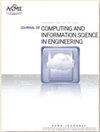Parallel Alternating Direction Primal-Dual (PADPD) Algorithm for Multi-Block Centralized Optimization
IF 2.6
3区 工程技术
Q2 COMPUTER SCIENCE, INTERDISCIPLINARY APPLICATIONS
Journal of Computing and Information Science in Engineering
Pub Date : 2023-02-06
DOI:10.1115/1.4056853
引用次数: 1
Abstract
In this paper, a centralized two-block separable convex optimization with equality constraint and its extension to multi-block optimization are considered. The first fully parallel primal-dual discrete-time algorithm called Parallel Alternating Direction Primal-Dual (PADPD) is proposed. In the algorithm, the primal variables are updated in an alternating fashion like Alternating Direction Method of Multipliers (ADMM). The algorithm can handle non-smoothness of objective functions with strong convergence. Unlike existing discrete-time algorithms such as Method of Multipliers (MM), ADMM, Parallel ADMM, Bi-Alternating Direction Method of Multipliers (BiADMM), and Primal-Dual Fixed Point (PDFP) algorithms, all primal and dual variables in the proposed algorithm are updated independently. Therefore, the time complexity of the algorithm can be significantly reduced. It is shown that the rate of convergence of the algorithm for Quadratic or Linear cost functions is exponential or linear under suitable assumptions. The algorithm can be directly extended to any finite multi-block optimization without further assumptions while preserving its convergence. PADPD algorithm not only can compute more iterations (since it is fully parallel) for the same time-step but also can have faster convergence rate than that of ADMM. Finally, two numerical examples are provided in order to show the advantageous of PADPD algorithm.多块集中优化的并行交替方向原对偶(PADPD)算法
研究了一类带等式约束的集中式两块可分凸优化问题,并将其推广到多块优化问题。提出了第一个完全并行的原始对偶离散时间算法——并行交替方向原始对偶算法(PADPD)。该算法采用乘法器交替方向法(ADMM)交替更新原始变量。该算法能够处理目标函数的非光滑性,具有较强的收敛性。不同于现有的离散时间算法,如乘数法(MM)、ADMM、并行ADMM、双交替方向乘数法(BiADMM)和原始-对偶不动点(PDFP)算法,该算法中所有的原始和对偶变量都是独立更新的。因此,可以显著降低算法的时间复杂度。结果表明,在适当的假设条件下,该算法对二次代价函数或线性代价函数的收敛速度是指数的或线性的。该算法可以直接扩展到任意有限多块优化,无需进一步的假设,同时保持其收敛性。PADPD算法不仅可以在相同的时间步长下计算更多的迭代(因为它是完全并行的),而且具有比ADMM更快的收敛速度。最后给出了两个数值算例,以说明PADPD算法的优越性。
本文章由计算机程序翻译,如有差异,请以英文原文为准。
求助全文
约1分钟内获得全文
求助全文
来源期刊
CiteScore
6.30
自引率
12.90%
发文量
100
审稿时长
6 months
期刊介绍:
The ASME Journal of Computing and Information Science in Engineering (JCISE) publishes articles related to Algorithms, Computational Methods, Computing Infrastructure, Computer-Interpretable Representations, Human-Computer Interfaces, Information Science, and/or System Architectures that aim to improve some aspect of product and system lifecycle (e.g., design, manufacturing, operation, maintenance, disposal, recycling etc.). Applications considered in JCISE manuscripts should be relevant to the mechanical engineering discipline. Papers can be focused on fundamental research leading to new methods, or adaptation of existing methods for new applications.
Scope: Advanced Computing Infrastructure; Artificial Intelligence; Big Data and Analytics; Collaborative Design; Computer Aided Design; Computer Aided Engineering; Computer Aided Manufacturing; Computational Foundations for Additive Manufacturing; Computational Foundations for Engineering Optimization; Computational Geometry; Computational Metrology; Computational Synthesis; Conceptual Design; Cybermanufacturing; Cyber Physical Security for Factories; Cyber Physical System Design and Operation; Data-Driven Engineering Applications; Engineering Informatics; Geometric Reasoning; GPU Computing for Design and Manufacturing; Human Computer Interfaces/Interactions; Industrial Internet of Things; Knowledge Engineering; Information Management; Inverse Methods for Engineering Applications; Machine Learning for Engineering Applications; Manufacturing Planning; Manufacturing Automation; Model-based Systems Engineering; Multiphysics Modeling and Simulation; Multiscale Modeling and Simulation; Multidisciplinary Optimization; Physics-Based Simulations; Process Modeling for Engineering Applications; Qualification, Verification and Validation of Computational Models; Symbolic Computing for Engineering Applications; Tolerance Modeling; Topology and Shape Optimization; Virtual and Augmented Reality Environments; Virtual Prototyping

 求助内容:
求助内容: 应助结果提醒方式:
应助结果提醒方式:


